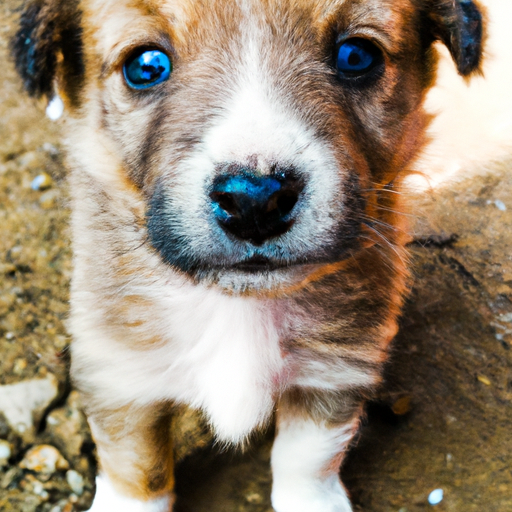An Introduction to Puppy Eyes
You’ve probably experienced it. That moment when your puppy looks up at you with those round, innocent eyes. It’s a look that’s almost impossible to resist. But have you ever wondered why? Why do puppy eyes have such a profound effect on us? Let’s dive into the world of puppy eyes and understand their power and purpose.
The Science Behind Puppy Eyes
Science has an explanation for the ‘puppy eyes’ phenomenon. Puppies have a facial muscle that allows them to raise their inner eyebrow, making their eyes appear bigger and sadder. This action triggers our nurturing instincts.
| Puppy’s Action | Human’s Response |
|---|---|
| Raises inner eyebrows | Nurturing instincts |
Interestingly, this muscle appears to be absent in wolves, suggesting that dogs may have evolved this feature specifically to communicate with humans.
The Power of Puppy Eyes
The power of puppy eyes is undeniable. They can influence your behavior in surprising ways:
- Eliciting Care: Puppy eyes can make you feel an urge to protect and care for your pet.
- Building Connection: They can help build a bond between you and your puppy.
- Manipulating Behavior: Sometimes, puppies use their eyes to get what they want, like a treat or a belly rub.
How Puppies Use Their Eyes
Puppies don’t just use their eyes to get treats. They use them to communicate a range of emotions and needs. Here are a few examples:
- Excitement: Wide eyes and wagging tails often mean your puppy is excited to see you.
- Fear or Anxiety: If your puppy is avoiding eye contact, it might be scared or anxious.
- Submission: Averting gaze is a sign of submission in the canine world.
Responding to Puppy Eyes
Knowing how to respond to puppy eyes is crucial. It can help you build a stronger bond with your puppy and meet their needs effectively. Here’s how you can respond:
- Understand the Message: Try to understand what your puppy is trying to communicate. Is it excitement, fear, or a plea for a treat?
- Respond Appropriately: Your reaction should match your puppy’s need. If it’s scared, offer comfort. If it’s excited, share its joy.
- Set Boundaries: While it’s important to respond to your puppy’s needs, it’s equally important to set boundaries. Don’t let those puppy eyes manipulate you into giving treats all the time!
The Significance of Eye Contact
Eye contact plays a vital role in human-puppy communication. When your puppy makes eye contact, it’s not just looking at you; it’s trying to communicate. It’s a sign of trust and connection. But remember, avoid intense, prolonged eye contact as it can be perceived as a threat by your puppy.
How to Encourage Healthy Eye Contact
Encouraging healthy eye contact is an important part of puppy training. Here are a few tips:
- Use Positive Reinforcement: Reward your puppy with treats or praises when it makes appropriate eye contact.
- Train Slowly: Don’t rush the training. Start with short periods of eye contact and gradually increase the duration.
- Make It Fun: Turn eye contact training into a game. This will make the experience enjoyable for your puppy.
FAQ
Why do puppies have such big eyes?
Puppies have big eyes because they are born with almost fully developed eyes. This feature, combined with their ability to raise their inner eyebrows, creates the ‘puppy eyes’ effect.
Is it bad to stare into my puppy’s eyes?
Intense, prolonged staring can be perceived as a threat by your puppy. However, brief periods of eye contact can help build trust and connection.
What should I do if my puppy avoids eye contact?
If your puppy avoids eye contact, it may be feeling anxious or fearful. Try to identify the source of stress and provide comfort. If the behavior persists, consider seeking professional help.
Can I train my puppy to make eye contact?
Yes, you can train your puppy to make eye contact. Use positive reinforcement methods and make the training process fun and engaging.
In conclusion, puppy eyes are more than just a cute feature. They are a powerful communication tool that puppies use to connect with their human caregivers. By understanding and appropriately responding to ‘puppy eyes’, you can build a stronger and healthier bond with your furry friend.



